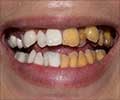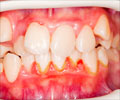Routine gum treatments do not reduce the risk of early delivery in pregnant women with periodontal disease, according to a new study by researchers from Duke University Medical Center and the University of North Carolina at Chapel Hill.
It was earlier found that gum disease was associated with very preterm deliveries (defined as less than 32 weeks gestation), which led insurance policies and healthcare providers to recommend scaling and root planing, sometimes referred to as "deep cleaning," in pregnant women.It was believed that such care had the potential to reduce preterm delivery risk.
However, the new findings, based on a randomized trial of 1,800 pregnant women with periodontal disease, indicate that routine gum treatments do not reduce the risk of early delivery.
"I’m always asked whether we should mandate dental treatment for all pregnant women. The biggest implication of this study is that this level of standard periodontal care will not affect the birth outcome," said Amy Murtha, MD, director of obstetrics research at Duke University Medical Center in Durham, NC.
However, Murtha said that the findings do not suggest that pregnant women should not get dental exams and treatment as needed; they should.
"Our study emphasizes that treating periodontal disease during pregnancy is safe, but that standard periodontal care is not enough," said Murtha.
Advertisement
The bacterial infection attacks the teeth-supporting tissues below the gum line. If left untreated, it can lead to tooth loss as well as a host of other problems.
Advertisement
Overall, no significant differences were reported regarding obstetric or neonatal outcomes when the two groups were compared.
Despite the findings, Murtha said much remains unknown about the relationship between the two conditions.
"Periodontal disease and poor pregnancy outcomes travel together, but we don’t know why."
Nor do researchers understand how or why pregnancy appears to jumpstart the onset and progression of the disease.
Murtha added that it might be that a more aggressive approach to periodontal disease management could have a different outcome.
He presented the findings at the annual meeting of the Society for Maternal-Fetal Medicine in San Diego.
Source-ANI
SRM/SK











